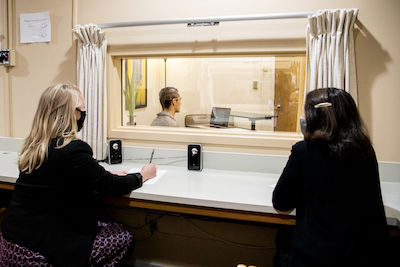When UW–Madison shut down nearly all in-person operations due to the growing threat of the coronavirus in March 2020, Stephanie Graham, the director of the Counseling Psychology Training Clinic (CPTC), was faced with a dilemma: How could the clinic continue to provide mental health services for its clients, when all of its counselors are graduate students who require supervision?
Graham, for example, did not feel comfortable with beginning student clinicians delivering unsupervised therapy from their homes. “There is some risk involved in that model,” she said. “If the client was suicidal, for example, it would be hard for me to intervene immediately.”
Yet despite the initial challenges brought on by the pandemic, the CPTC has been able to successfully pivot to serving its clients remotely.

The CPTC is staffed by graduate students in the Department of Counseling Psychology’s master’s and doctoral programs who are supervised by licensed psychologists. Aligning with the department’s values and mission, Graham said the clinic’s foci are on training “socially just” mental health practitioners and offering high-quality, cost-efficient, and multiculturally competent psychological and mental health services to UW–Madison students and Dane County residents.
Typically, the clinic serves 150 to 175 clients each year. About 75 percent of these are UW–Madison students, many of whom are referred by the university’s Division of Diversity, Equity, and Educational Achievement (DDEEA). The clinic has a longstanding partnership with the DDEEA to increase access to psychological services for underserved students. Ser- vices are intended to offer students culturally competent mental health support that enhances their academic engagement and performance.
Other clients are community members who need afford- able, accessible mental health services.
“We offer sliding-scale (services to the community),” Graham said. “We do not want cost to be a barrier, so we often will work with a client on a reasonable fee and do offer free services, depending on the client’s financial need.”
When most campus facilities were closed in the spring of 2020 due to the pandemic, the clinic worked hard to maintain regular communication with its clients and student clinicians, and only Graham, a few senior staff members, and advanced doctoral students held remote counseling sessions with clients, while working from home.
With most of campus reopening at the start of the fall semester, graduate student clinicians are now meeting with clients virtually while working in the clinic space.
“So now we just have one level of remote — the client and the counselor,” Graham said, which provides a better training experience for the graduate students. While the counseling sessions are happening, Graham or Pa Her, CPTC’s assistant director, are in the clinic to observe the students’ work and provide feedback and support when needed.
Graham said the new way of operating is going smoothly so far. The clinic has not seen a decrease in clients requesting ser- vices, and Graham said she feels good about the clinical training experience for the graduate students.
Her, who before becoming assistant director had worked and completed her clinical training requirements at the clinic as a graduate student, agreed. “I don’t think telehealth is going to go away after there’s a vaccine for COVID, it’s here to stay,” she said. “So … from that perspective, (our student counselors) are learning the skill set right now to be prepared for the world to come.”